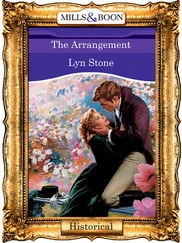“How?” she said, and she was still crying, her mouth swollen and red.
He did not know. In fact, it was a question he could barely understand, and he felt dumb and childlike looking at her, filled with a child’s sense of relief, as though someone had only turned on the lights and everything was better.
“Stop crying,” he said. “We’ll think of something.”
“What?”
“We thought of this.”
“This is horrible.”
“Then the next thing will be better, no? Mary.”
He took the hand that held hers and brushed her hair from her eyes, again and then again, he couldn’t stop his hand now, tracing her cheek and jawline, the fine bow of her clavicle where her pulse hammered, he could see it against her skin, another thing that seemed impossible, and yet here it was, her blood, throbbing. He brought his mouth down, wanting to feel it, his lips opening, he could not stop himself, his hands beneath her nightgown now and pushing up, her blood against his mouth and pushing, Mary Frances.
* * *
“He knows.”
“Are you sure?”
“He knows something.”
“Maybe that’s a good thing, a better thing. Maybe that’s just the next step.”
They were quiet a long time.
“I don’t think so.”
* * *
On the funicular to Mont Pèlerin, they were the only people in the car. The calliope played, and the cables tightened and drew overhead, the winter-dead meadows giving way to alpine shale and pines, sharp and true against the ever-blue sky. They stood at either end of the car, their backs to the rails, Mary Frances looking down at Tim. She seemed, to him, to be flying, only the sky behind her as they went up. Her grip on the rail to her back was tight, her body moving with the groan and shift, the music like something plucked on a saw.
“I love this thing,” he said.
“Let’s buy it. Let’s live here.”
“You say that of everyplace we go, dear.”
“Well, I mean it.” She shrugged prettily, or perhaps it was just the rocking of the car. He loved to watch the way she absorbed motion, the way she landed in the world.
“You are magnificent,” he said. “I mean that too.”
At the top, they passed the Hotel Mirador, its elaborate balconies and patios, and took the trail along the mountain’s ridge at a pace that left them just enough breath. The air was thin and still cold; they walked fast to keep their blood moving, and they did not talk. Tim listened to the solid grind of her boots on the trail, the wick of her pant legs. In her satchel, she carried a thermos of warmed red wine, a bar of chocolate, and a loaf of bread. Her breath heaved white ahead of her, her lips parted. She licked them, and smiled.
* * *
There was more money in the kitty than Al had put in it; he emptied the can onto the table and counted it twice, almost three hundred dollars. Tim had been adding to it rather than taking away. The yellow light buttered everything in the kitchen. He was suddenly ashamed to have trusted one man with so much without thinking, ashamed to have trusted anyone at all.
There, on the table, was Mary Frances’s notebook.
The thing was, it was nothing to open a book, to read it. It left no marks, no broken seals or waste. He had never thought about it so brutally, but really — all this fuss over who was writing, not writing seemed suddenly ridiculous. There was no way Mary Frances would ever know if he read her notebook or not. It was the thinnest line, requiring the slightest effort. How many of these lines had been crossed in his marriage? What was one more now?
He poured himself a drink, pulled out a chair, and sat. He opened the book, and he was still reading when Tim returned to the apartment.
He pushed the notebook away, pushed back from the table, but it was the quick move at the hot stove; he’d been caught. He grinned stupidly. His reflexes were failing him.
“Any good?” Tim asked. His face was neutral, passive.
Al tried to see him for the first time as the man who had stolen his wife, but it was almost impossible to forget what he already knew and loved.
“Drink?” he said.
Tim looked at his wrist; Al didn’t see a watch. “I can’t. I’ve got another meeting with the dealer from Geneva at four.”
“Geneva.” Al rolled the short glass between his palms. “Are you headed to Geneva soon?”
“Hopefully, some paintings will be.”
“But you won’t need to go.”
“No. I’ll stay.”
Suddenly Al was standing, his chair pitching back behind him, and he grabbed Tim by the shoulders in a rough embrace. His body felt enervated, terrified, and he clasped Tim closer, unable to form words that might make sense. He could feel Tim’s breath push against the bones in his chest, breakable. Al was sweating now. Tim’s hands came up to free himself.
“I have to go, Al,” he said. “I’ll catch up with you at supper. Perhaps a night on the town, say. We haven’t done that in a while.”
Al shook his head. He could not fathom the kind of arrangements Tim must be managing within himself to suggest such a thing. What, exactly, had they all been doing?
“The other night—”
“It’s okay, Al.” Tim reached across the table and took the notebook, slipping it back into the cupboard where Mary Frances kept it. “I’m fine, now.”
“Fine?” This was insane. “Fine?”
Tim nodded, rapped the tabletop twice with his knuckles, and left the kitchen empty-handed.
This couldn’t go on any longer. Al took the bottle to his room, dragged the armchair across the floor to wait for Mary Frances.
* * *
She knew what he was going to say as soon as she walked into the bedroom, as soon as she saw Al’s face. She sat on the edge of the bed with her skirt smoothed over her knees and stared at her lap like a scolded child. The conversation ahead lay in blackness. If she took a deep breath, it would be over soon, she’d learn her punishment and take it. They just had to get through it.
“Al—”
“I’m leaving.”
“What?”
“I’m going to Salzburg for the summer. George will be there, and we’ve talked of writing a paper together.”
“All summer?”
He laughed. “Yes, my dear, all summer. You and Tim will have to find some way to make it without me.”
“Well. I’ll come visit for a few weeks. We can—” She met his eyes and the sentence evaporated, the anger and hurt and drink dangerously plain on his face.
“Visit,” he said. “Visiting your husband while you live here. That’s very bohemian of you, MFK Fisher.”
“I only meant—”
“Of course.” He reached blindly for the bottle beneath his chair, knocking it over. There was no glass. He must have been drinking for hours. He pushed himself upright and came to stand too close in front of her, all gray flannel and loom.
“You haven’t the slightest idea what you’re doing,” he said.
She didn’t answer, but lifted her eyes finally to his and was surprised to feel the measure of sadness there. She had been so insulated for so long, had felt so little; this sharp pain made her flinch.
“Do you?” he said again.
“No.”
He made a dismissive sound, bending to where his sport coat had slipped from the back of the chair. He dove his arm into the sleeve once, twice without shooting it; the sleeve was inside out. He wadded the lapel in his fist and seemed, almost, to tremble.
“Here, let me,” she said.
“Let you what? What now?”
But she took the jacket anyway and reached into the sleeve, drawing it right. She held it for him while he slipped into the shoulders. He focused on a spot on the wall above her head to hold his balance.
“I’m going to get a job teaching, back in the States,” he said. “I don’t care if it bores me to tears. I haven’t written in months, years, and The Ghost is dead now. A great poem, squandered on… this.”
Читать дальше












